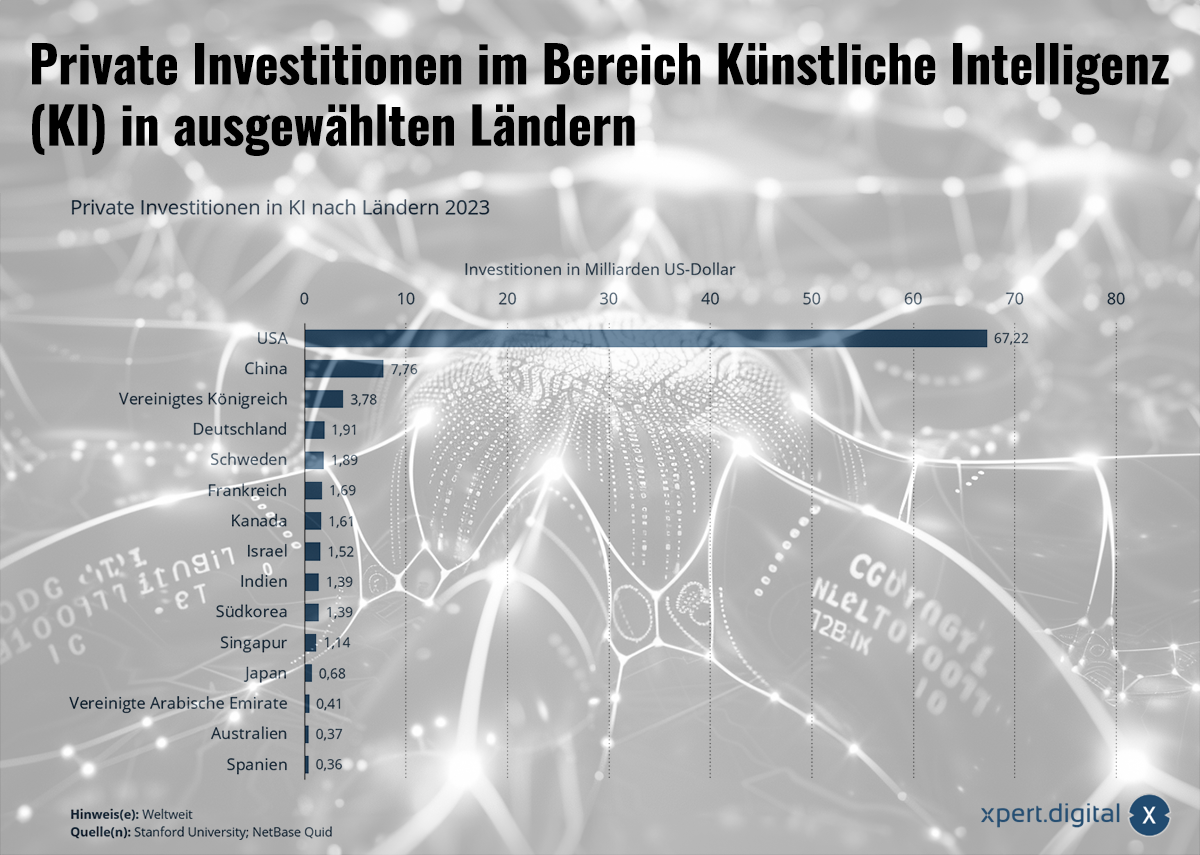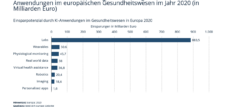
Future technology artificial intelligence: AI investments in a global comparison: The USA is leading, China is catching up and Europe and Germany are fighting to keep up - Image: Xpert.Digital
⚖️🔍 Investment differences in AI: USA leads by a huge margin
💡📈 The United States of America dominates the global artificial intelligence (AI) investment market by an impressive margin. In 2023, around $67 billion in private investments flowed into the US AI sector, while Germany lagged far behind at $1.91 billion. These numbers highlight the immense gap between the two nations in terms of willingness to invest and commit to AI technology.
🔍📊 A look at long-term investment trends
The discrepancy between the USA and Germany becomes even clearer when you look at investments over a longer period of time. Between 2013 and 2023, private players in the United States invested approximately $335 billion in AI technologies. In comparison, investments in Germany in the same period only amounted to around 10 billion US dollars. These vast differences highlight the U.S.'s leading role in the global competition for dominance in AI development and application.
But not only Germany, but also the entire European Union is having difficulties keeping up with the global competition for AI investments. While EU countries, including the UK, were able to raise around $11 billion in private investment in AI in 2023, investment in the US was more than six times higher. This large gap presents Europe with an enormous challenge when it comes to remaining internationally competitive and keeping up technologically.
🌟🤖 The role of leading nations in AI development
A closer look at the leading countries in the field of AI development shows that the USA is currently the undisputed leader. This is due to several factors: On the one hand, American tech giants such as Google, Microsoft, OpenAI and Meta dominate the market by investing enormous resources in research and development. On the other hand, there is a vibrant start-up scene in the USA that is producing innovative AI applications. The country also benefits from a strong infrastructure, a broad academic base and a technology-friendly investment climate.
🚀🌐 China in the fast lane
While the US holds the top spot, China's role in the AI competition should not be underestimated. China has invested heavily in artificial intelligence in recent years and aims to be the world leader in this field by 2030. The country benefits from its large population base, which serves as a data source, as well as government-funded initiatives to promote innovation and AI development. Major Chinese tech companies such as Alibaba, Baidu and Tencent play a central role in the national strategy.
🇬🇧🔬 Great Britain as a leading AI location in Europe
Within Europe, the UK has taken a pioneering role and ranks third in the world for AI investment. The UK has secured a strong position, particularly through companies such as DeepMind, which is doing groundbreaking work in the field of machine learning. Despite the uncertainty caused by Brexit, the country remains a center for AI innovation and research in Europe.
⚙️🌍 Germany – a European player with potential
Germany, the leading country within the European Union in the area of AI investments, still faces major challenges. While there is significant investment in the AI sector from companies such as Siemens, Bosch and SAP, it lacks the scale and speed necessary to compete globally.
▶️ While Germany is strong in industrial automation and specialized AI applications, there is a need to catch up in the breadth of innovations and support for start-ups.
🌐⭐ Other major players in the global AI landscape
In addition to the USA, China, Great Britain and Germany, there are other countries that have made notable progress in the field of AI. Canada, Israel, Singapore, France, Japan and South Korea have also positioned themselves as key players in global AI development. Each of these countries brings different strengths and focuses to the AI sector, from significant fundamental research (like in Canada) to a strong talent base (Israel) to strategic government investments (Singapore and South Korea).
🛠️💡 The difference between developing and using AI
A particularly interesting aspect in the global competition for artificial intelligence is the difference between the development of AI and its actual application. While the US and China dominate the investment and development of AI technologies, the use of AI tools looks somewhat different around the world.
Statistics show that the US continues to lead the use of AI tools with 22.62% of global AI tool traffic. What is surprising, however, is that countries like India and Indonesia follow in second and third place, with a share of 8.52% and notable growth in usage respectively. Countries like the Philippines and Brazil are also showing increasing adoption of AI tools, indicating the potential for these technologies to find traction in more than just technologically leading nations.
This difference between the development and use of AI shows that even countries that are not necessarily considered AI innovation centers show a high willingness to implement these technologies. This can be particularly beneficial in areas such as customer service, automated processing and e-commerce, where AI tools already provide significant added value.
🌍🔧 Challenges and opportunities for Europe
Europe faces the challenge of not only closing the investment gap with the USA and China, but also promoting the use of AI technologies. It is not enough to simply invest in research and development. The decisive factor will be how quickly and effectively the developed technologies can be integrated into everyday industrial and social life.
An important step in this direction is the creation of a uniform regulatory framework in the EU to promote innovation while addressing ethical and data protection concerns. The European Commission has already laid the foundation for such regulation with its “White Paper on Artificial Intelligence”, but implementation remains a challenge, especially given the different priorities and economic realities in individual member states.
At the same time, the AI sector offers enormous opportunities for Europe. The continent has a strong industrial base, particularly in areas such as automotive, engineering and healthcare, where AI applications have the potential to enable significant efficiencies and innovation. If Europe can combine its strengths in traditional industry with the possibilities of AI, it could pave the way for a new era of economic growth.
🔧📈 Germany must make significant efforts to keep up with the competition
The global artificial intelligence landscape is currently dominated by the USA, while China is emerging as a serious challenger. Europe, especially Germany, must make significant efforts to keep up with the competition. The key for the future lies not only in increasing investments, but also in quickly implementing and leveraging AI technologies to achieve economic and social benefits.
Countries like the UK, Canada and Israel show that even smaller nations can play a leading role in AI if they pursue the right strategies. At the same time, a look at countries like India and Indonesia makes it clear that the adaptation and use of AI tools does not necessarily have to correspond to the leading innovation countries. This also opens up the opportunity for emerging countries to advance their economic development through the use of AI technologies.
Artificial intelligence remains one of the most dynamic and promising technological areas of our time, whose development will shape the economic and geopolitical landscape of the coming decades.
📣 Similar topics
- 🇺🇸 The US dominance in AI investments
- 💶 Europe is fighting to keep up with AI funding
- 🌐 Global investment trends in artificial intelligence
- 📊 USA vs Europe: A comparison of AI development
- 🇨🇳 China on the way to AI supremacy
- 🇬🇧 Britain's strength in the European AI scene
- 🇩🇪 Germany: Challenges and opportunities in AI
- 🌍 Global players in the AI industry
- ⚖️ Differences between AI development and use
- 🚀 The future of AI in Europe: strategies and opportunities
#️⃣ Hashtags: #ArtificialIntelligence #Investment #Technology #Europe #USA
🤖🎨 AI models in numbers: Top 15 large language models – 149 basic models / “foundation models” – 51 machine learning models
AI models in numbers: 15 large language models-149 basic models / “Foundation models”-51 Machine learning models-Image: Xpert.digital
Artificial intelligence (AI) has made significant progress in recent years and has had a notable impact on various industries and research areas. In particular, the development of large language models (LLMs) and foundation models has expanded the potential and range of applications of AI technologies. In this article we take a detailed look at the current developments in the field of AI models, their importance and their possible applications.
It is important to note that the figures mentioned regarding the number and development of AI models may be subject to fluctuations, as research and technological advances in this area are developing very dynamically. Despite possible deviations, the data listed provides solid guidance and provides a clear overview of the current status of AI models as well as their growing potential and influence. They serve as a representative basis for understanding the important trends and developments in artificial intelligence.
More about it here:
We are there for you - advice - planning - implementation - project management
☑️ Industry expert, here with his own Xpert.Digital industry hub with over 2,500 specialist articles
I would be happy to serve as your personal advisor.
You can contact me by filling out the contact form below or simply call me on +49 89 89 674 804 (Munich) .
I'm looking forward to our joint project.
Xpert.Digital - Konrad Wolfenstein
Xpert.Digital is a hub for industry with a focus on digitalization, mechanical engineering, logistics/intralogistics and photovoltaics.
With our 360° business development solution, we support well-known companies from new business to after sales.
Market intelligence, smarketing, marketing automation, content development, PR, mail campaigns, personalized social media and lead nurturing are part of our digital tools.
You can find out more at: www.xpert.digital - www.xpert.solar - www.xpert.plus

